
by Dr. Jacqueline S. Allen | Nov 23, 2020 | Blog, Dental Implants, Phoenix Endodontic Group
Dental patients have a number of choices when one or more natural teeth cannot be saved, but not all choices are created equal. More and more, adults are choosing dental implants because implants offer advantages not found with other options. Dental implants are one of the most permanent and durable solutions to tooth loss, if the process begins with careful analysis and preparation by your dental team to ensure success.
Let’s take a look at why dental patients are increasingly choosing implants as their restoration of choice.
 Top Reasons Patients Choose Dental Implants
Top Reasons Patients Choose Dental Implants
Dental implants have a very high success rate. A study of the effectiveness of dental implants found that over the course of many years, implants maintain a success rate of between 95 and 99 percent.
Implants can replace a single tooth, several teeth, or an entire arch of teeth. Dental implants are flexible in terms of how many teeth they replace. Given the negative health consequences to losing ANY teeth, the ability to replace them is important.
Dental implants do not require the alteration of healthy natural teeth. Dental bridges are often considered as an option for a person who has lost several teeth. However, a major downside is the necessity of grinding down part of the natural tooth on each side of the bridge. This can weaken tooth structure and lead to decay or additional tooth loss. Dental implants require no such destructive alteration.
Dental implants stop bone loss in the jaw and preserve natural facial contours. Implants are the only tooth replacement option that can stop the bone loss accompanying loss of multiple teeth. Consequently, they also help prevent the “facial sag” that is a long-term consequence of tooth loss.
Dental implants can be more comfortable than other options. Implants use biocompatible titanium fused into your jaw to provide a stable platform for a crown that takes the place of the natural tooth. Implants then function like natural teeth. Dentures, even well-made sets, can come with irritation, soreness, and other challenges.
“Dental implants can be a life-altering option when dealing with tooth loss,” says Dr. Jaqueline S. Allen, who practices at the Phoenix Endodontic Group. “Our practice is skilled and experienced at determining whether you are a good candidate for this type of restoration.”

by Dr. Jacqueline S. Allen | Sep 21, 2020 | Blog, Dental Implants, Phoenix Endodontic Group
Replacing a tooth – or all of them, if necessary – with a dental implant is a major health decision. It is important to understand what a dental implant can do for you, how the procedure will work, and postoperative care. Here are five questions you will find helpful to know the answers to before beginning your dental implant procedure.
 5 Questions To Ask Before Choosing A Dental Implant
5 Questions To Ask Before Choosing A Dental Implant
-
Why does it matter if I replace a failing/missing tooth? Although a tooth extraction may seem less expensive, there are a host of oral health issues that can be prevented by getting an implant. Dental implants can prevent shifting of your remaining natural teeth, make it less likely you’ll suffer gum disease or tooth decay, and can prevent the “facial collapse” that often happens with the loss of one or both arches of your teeth.
-
Why is an implant favored over a root canal? It’s good to know why your dentist does not recommend trying to save your natural tooth. Perhaps the structure of your tooth has deteriorated to the point it simply won’t support a root canal and a crown. Or perhaps there is a crack, especially one extending down below the gumline, that would make a root canal impossible. Your dentist should be able to explain why they are recommending a dental implant over a root canal and what clinical conditions make you a better candidate for the implant.
-
How long will the entire implant process take? The answer to this question will be highly individualized, depending on how many natural teeth will be replaced, if you have bone density challenges in your jaw that need to be addressed, if your dentist recommends using All-On-4 overdentures for a full arch of dental implants, and other factors. Your dentist should be able to provide a clear, easy-to-understand treatment timeline for you.
-
Will my implant be successful over the long term? Overall, dental implants have a high success rate – usually about 95 percent. They are designed to last a lifetime. What you really want to find out from your dentist by asking this question is how likely it is that a dental implant will be a permanent solution to your oral health challenges.
-
What do I need to know about managing pain after the dental implant? Your dentist should provide you a complete postoperative pain guide, that will cover how to manage discomfort (which is normal during the first few days after the procedure) and what types of pain you should call your dentist about. In general, nearly all swelling, tenderness or discomfort should be gone within seven to 10 days of your procedure.
“At Phoenix Endodontic Group, we want to ensure our patients understand why we recommend a dental implant over another procedure,” says Dr. Jaqueline S. Allen. “Answering patient questions is part of how we partner together to ensure the experience is comfortable and successful.”
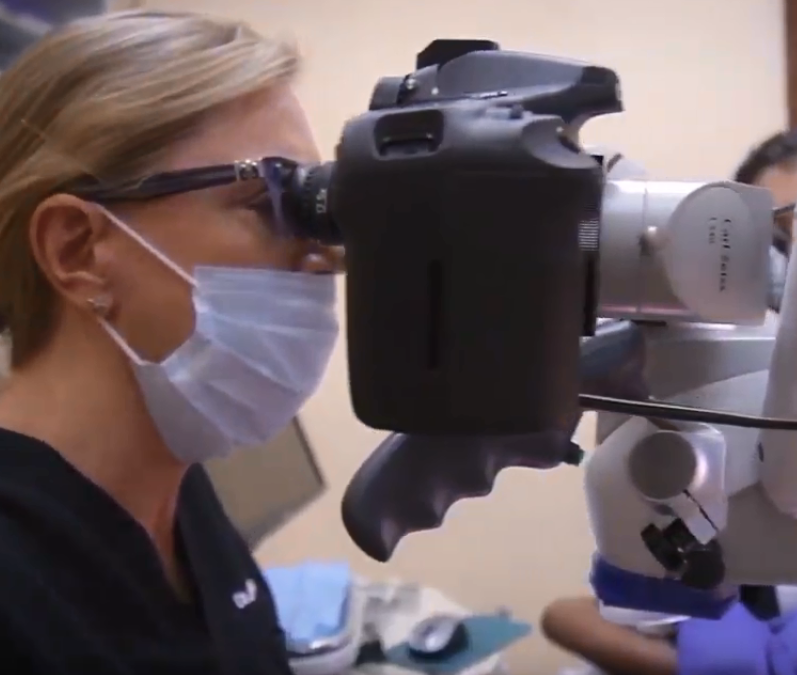
by Dr. Jacqueline S. Allen | Jul 20, 2020 | Blog, Dental Implants, Endodontist, Phoenix Endodontic Group
For those struggling with problems with natural teeth, one question can become paramount: “Should I have an endodontist treat my tooth with a root canal, or should I consider getting a dental implant?”
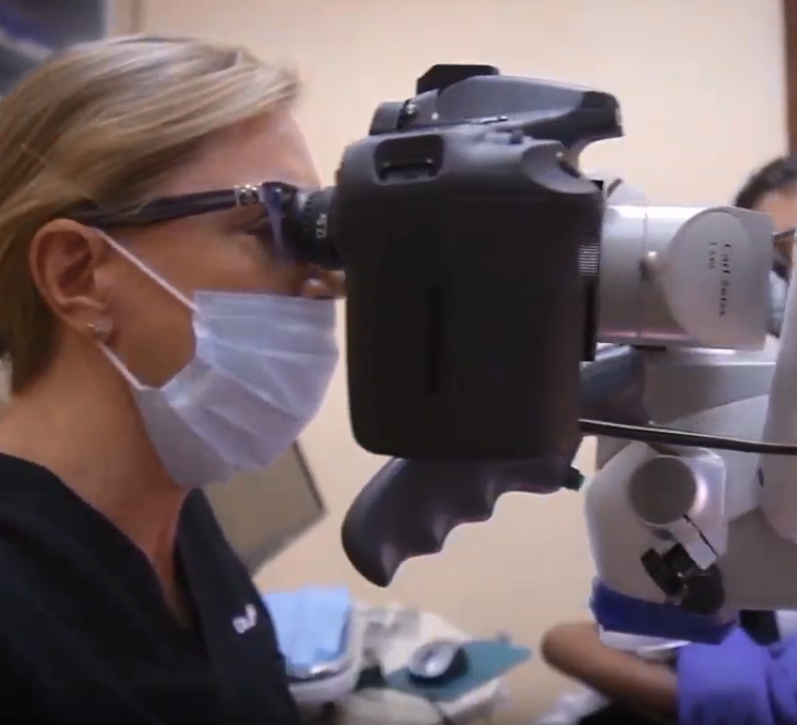
The decision-making process related to a dental implant involves many factors. However, there are numerous situations in which a dental implant is clearly a strong choice to rectify your dental challenges, some of which are discussed below.
Situations That Support Choosing A Dental Implant
- Earlier attempts to save your natural tooth have been unsuccessful. If your natural tooth continues to have serious infection issues after a root canal or a root canal retreatment, it may be time to consider an implant.
- You have had gum disease around the impacted tooth/teeth. The declining health of your gums can damage your periodontal ligament, which plays a crucial role in attaching the roots of your tooth to your jaw. If the ligament cannot regenerate itself successfully, it becomes much harder to retain a natural tooth.
- You are not a strong candidate for a fixed bridge or a partial set of dentures. If you are struggling with one or several teeth adjacent to each other, it might seem more cost-effective to try a fixed bridge or partial dentures. However, not everyone can tolerate the feel of dentures and the care they require, and the alterations required for a fixed bridge require the adjacent teeth to be structurally sound.
- Your natural tooth is already gone. If you have already lost your tooth, a dental implant can play a key role in preventing further tooth loss and bone deterioration in the jaw. Unreplaced teeth can cause the remaining teeth to crowd together and can obviously interfere with clear speaking or eating a normal diet.
- You are in danger of losing an entire arch of natural teeth. In some cases, the more natural teeth you have that are in poor shape, the less likely a solution other than a dental implant will work. Dental implants can be customized to replace anything from one tooth to an entire arch of teeth.
“The question of how to treat failing natural teeth has an answer unique to each patient,” says Dr. Jacqueline S. Allen, who practices with the Phoenix Endodontic Group. “We can perform in-depth examinations and provide evidence-based treatment plans whether a dental implant, a root canal, or another type of intervention will provide the best long-term results.”
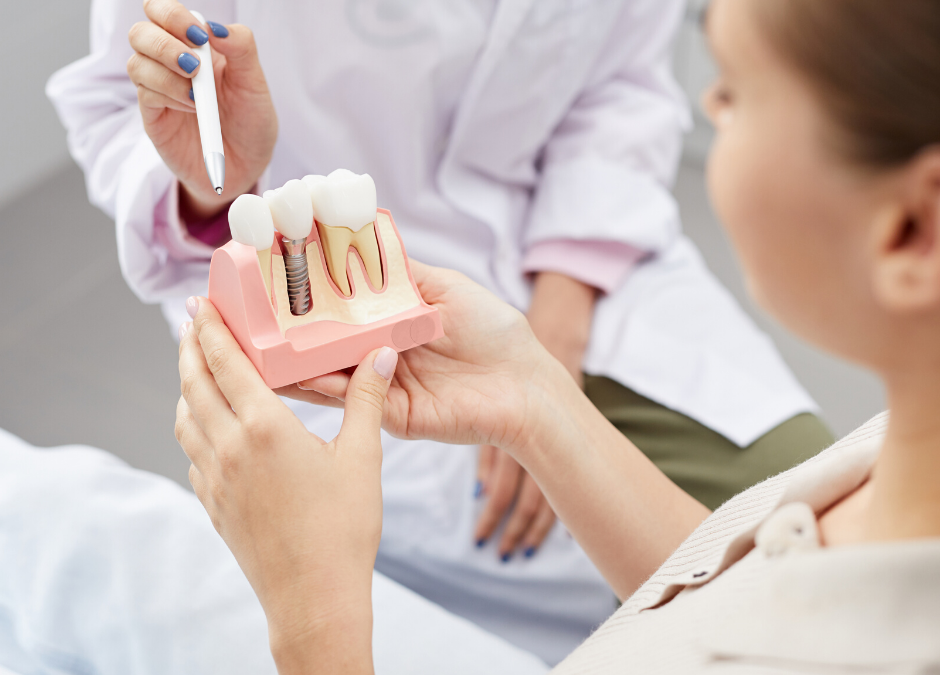
by Dr. Jacqueline S. Allen | Apr 22, 2020 | Blog, Dental Implants, Phoenix Endodontic Group
When considering dental implants, you can expect your endodontist to allow three to six months for healing, after placing the implant and before placing a permanent restoration on top of the tooth. The implant and its crown will take the place of your natural tooth. There are several factors influencing how quickly a dental implant will heal, and their interplay determines how quickly you can expect the process to be finished.
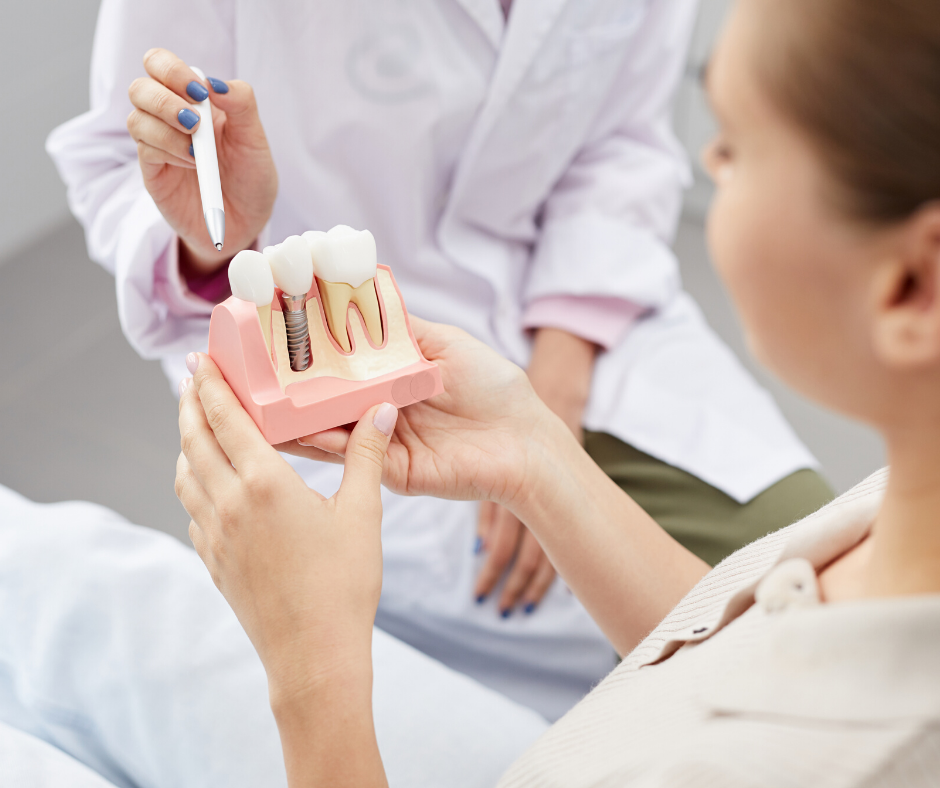
What Influences The Dental Implant Healing Process?
-
Bone loss in the area of the jaw receiving the implant. If the dental implant is replacing a missing tooth, or if the natural tooth being extracted was damaged, the bone density at the implant site may not be sufficient to allow the metal implant post and the jawbone to grow together. A bone graft may be required to prepare the site before the implant can be placed. In this case, the implant may require up to six months of healing before a permanent restoration can be placed on top of it.
-
Location of the natural tooth being replaced by the dental implant. A dental implant intended to replace a front tooth with its small roots will generally take less time to heal than back teeth or teeth with longer roots.
-
The presence of gum disease or infection in the natural tooth to be replaced. Active infection in a tooth or gum disease near the implant site will require a longer healing period because the infection or disease must first be controlled and healed.
Often, a temporary restoration such as a crown can be placed on a dental implant while it is healing. This is an option when it will not endanger the integration process, which will be evaluated by your endodontist.
“Two of the most important phases of the dental implant process are the diagnostic and planning stages,” says Dr. Jacqueline S. Allen, who practices with the Phoenix Endodontic Group. “Careful examination of the current state of a patient’s teeth and gums can help us provide a more accurate healing timeline.”

by Dr. Jacqueline S. Allen | Feb 20, 2020 | Blog, Dental Implants, Phoenix Endodontic Group
Sometimes to get the right answer about your oral health, you have to ask the right question. If your question is “Is it possible to perform a dental implant in one day?” the answer is a definite yes. However, if your question is “Can I have a dental implant done in one day?” the answer is a solid maybe.
Over the past few decades, dental implants – whether to replace one tooth or an entire arch of teeth – have become a popular alternative to dentures. However, a dental implant is a complex procedure. Your dentist or oral surgeon will need to conduct a thorough examination of the state of your teeth and gums to determine if a single-day implant would be successful for you in the long term.

Factors That Determine Whether A Single-Day Implant Process Is Possible
- How many natural teeth need to be replaced. The greater the number of failing or missing natural teeth, the more pre-treatment assessment planning it will take to ensure the success of a single-day implant. If failing teeth are to be extracted at the same time as the dental implants are placed, this will also impact how your dental team approaches the procedure.
- The bone density of your jaw. Dental implants are secured by metal posts or fixtures that are placed in your jawbone. If you need numerous implant posts to support the crowns that will replace your lost teeth above the gumline, you may need to undergo bone grafts to increase bone density.
- Your gums and remaining teeth must be healthy. For a single-day dental implant procedure to succeed, your mouth should be free of gum disease and infected or damaged teeth.
- You can commit to a significant healing period after your single-day implant is delivered. After a dental implant procedure, you must carefully watch what you consume for six to eight weeks, while your implants integrate into your jaw.
“Advancements in both technology and dental implant techniques allow us to place dental implants faster and with far less discomfort than ever before,” says Dr. Jacqueline S. Allen, an endodontist in practice at the Phoenix Endodontic Group. “Our staff can evaluate the condition of your teeth and gums and provide an accurate estimate of how long your dental implant may take to complete.”
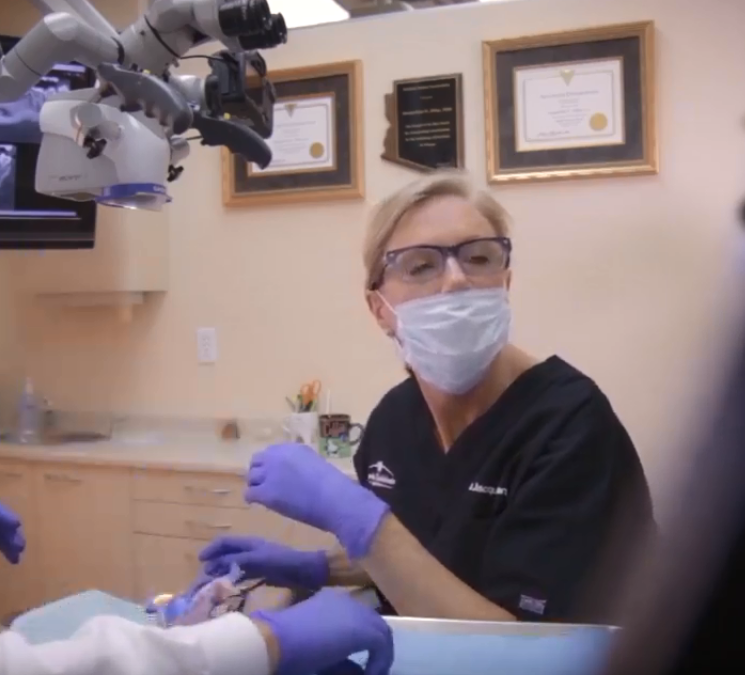
by Dr. Jacqueline S. Allen | Dec 22, 2019 | Blog, Dental Implants, Dentistry
While it’s often possible to save an injured or infected tooth, sometimes extraction is the best option. In those cases, it is important to replace the tooth as soon as possible with a dental implant. If gaps from extracted teeth are left as is, the interaction between the remaining teeth, the jawbone, and gums is disrupted. The jaw can lose bone density, causing it to shrink. Gums can pull away from the remaining teeth, and the teeth may loosen and move into the gap left by the extraction.

How Soon Can I Have A Dental Implant After A Tooth Is Removed?
The answer to how long you will have to wait for a dental implant after a tooth extraction – and how long the implant process will take to complete – depends largely on where the extracted tooth was located and the general state of your oral health.
Front teeth that had no infection at the time of extraction and had small roots (such as an incisor or canine) may be able to receive the dental implant the day that the tooth is removed. A crown can be placed on top of the implant in a few months, after the implant has integrated into the jaw bone. If the tooth in question was a back tooth, or had longer roots, it may be necessary to wait two or three months after extraction to place the dental implant. If the extracted tooth was infected, this can delay the placement of the dental implant even longer, in order to allow the site of the extraction to heal fully.
Bone loss in the jaw can cause a cascade of problems after a tooth is extracted, and if a patient’s bone density at the site of the extraction is low enough, they will likely require a bone graft. Sometimes the amount of bone to be grafted is significant enough that it will require several months for the graft to be integrated into the jaw bone. At other times, the amount to be grafted is small enough that it can be done at the same time the implant is placed.
“When preparing to provide a dental implant, it is important not to rush to place the implant,” says Dr. Jacqueline S. Allen, an endodontist practicing with the Phoenix Endodontic Group. “Our dental specialists can conduct a thorough examination and discuss the factors that will influence the timeline of your dental implant process.”

 Top Reasons Patients Choose Dental Implants
Top Reasons Patients Choose Dental Implants








